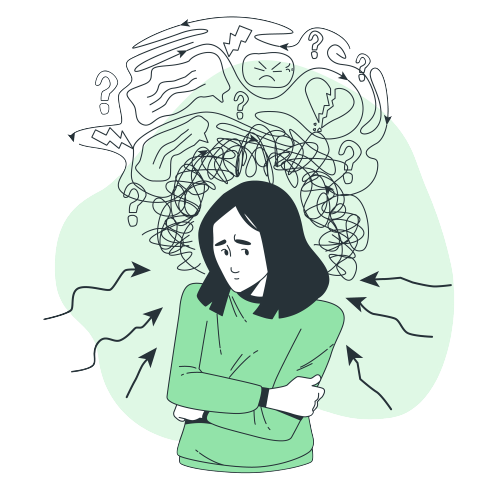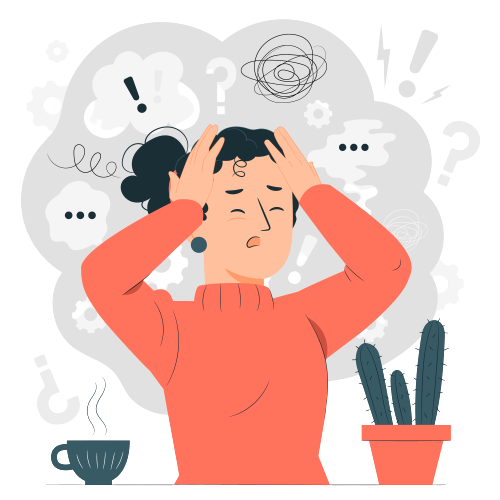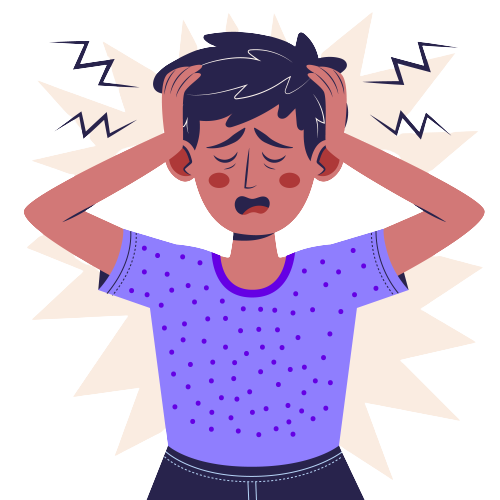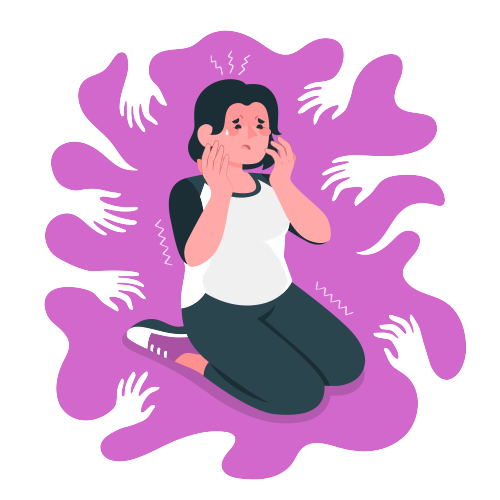Issues

Depression
Depression is a common mental health disorder characterized by persistent feelings of sadness, loss of interest or pleasure in activities, and a range of emotional and physical symptoms. It can impact daily life, relationships, and overall well-being. While everyone experiences periods of sadness, depression is more intense and long-lasting, often interfering with daily functioning. It can manifest differently for each person, with symptoms such as fatigue, changes in appetite, sleep disturbances, difficulty concentrating, and thoughts of worthlessness or suicidal ideation. Depression is a treatable condition, often managed through therapies like counseling and medication. Recognizing symptoms and seeking help is crucial for recovery and regaining a positive quality of life.

Anxiety
Anxiety is a common mental health condition characterized by persistent and excessive worry, fear, or apprehension. While some level of anxiety is a normal response to stress, anxiety disorders involve heightened and chronic feelings of unease that can interfere with daily life. Individuals with anxiety may experience physical symptoms like restlessness, racing heart, muscle tension, and difficulty concentrating. Different types of anxiety disorders, such as generalized anxiety disorder, social anxiety, and panic disorder, have unique triggers and symptoms. However, they share the common theme of distress and apprehension. Effective treatment options include therapy, medication, lifestyle changes, and self-care practices. Recognizing and addressing anxiety is essential for improved well-being and regaining control over one’s thoughts and emotions.

Stress
Stress is the body’s response to demanding situations that require adaptation or coping. While a certain amount of stress is normal and can even be motivating, excessive or chronic stress can have detrimental effects on mental and physical well-being. It often arises from challenges, responsibilities, and changes in life, and can manifest as emotional, cognitive, and physical symptoms. These symptoms may include irritability, difficulty concentrating, muscle tension, sleep disturbances, and more. Effective stress management involves recognizing triggers, practicing relaxation techniques, maintaining a healthy lifestyle, seeking social support, and using coping strategies such as time management and problem-solving. Managing stress is essential for maintaining mental resilience and overall health in the face of life’s pressures.

Low Confidence
Low confidence, also known as low self-esteem, is a common issue characterized by a negative perception of oneself and a lack of belief in one’s abilities. Individuals with low confidence often struggle with self-doubt, negative self-talk, and feelings of inadequacy. This can affect various aspects of life, including relationships, work, and personal goals. Low confidence can stem from past experiences, societal influences, and comparisons with others. However, it’s important to recognize that confidence can be cultivated and improved over time. Building self-assurance involves challenging negative beliefs, setting achievable goals, practicing self-compassion, and seeking support from loved ones or professionals. Addressing low confidence can lead to greater self-worth, increased resilience, and a more positive outlook on life.

Low Self Esteem
Low self-esteem is a psychological condition characterized by a negative perception of oneself and a lack of confidence in one’s abilities. People with low self-esteem often struggle with feelings of inadequacy, self-doubt, and a persistent belief that they are unworthy or incapable. This can impact various aspects of life, from relationships and work to personal growth. Individuals with low self-esteem may avoid challenges, fear judgment, and have difficulty asserting themselves. Recognizing and addressing low self-esteem is crucial for personal development and mental well-being. Therapy, self-care practices, positive affirmations, and cultivating a supportive environment are among the strategies that can help individuals build a healthier sense of self-worth and confidence.

Anger
Anger is a natural and complex emotion that arises in response to perceived threats, injustices, or frustrations. While it’s a normal part of human experience, uncontrolled or frequent anger can have negative consequences on mental health and relationships. It can manifest through various physical and emotional cues, such as raised voices, clenched fists, or irritability. Understanding the triggers and underlying emotions that contribute to anger is essential for managing it effectively. Healthy anger management involves recognizing early signs of anger, practicing relaxation techniques, communication skills, and seeking professional help when anger becomes overwhelming or disruptive. Learning to express anger in a constructive manner promotes emotional well-being and fosters healthier interactions with others.

Debt
Debt refers to the money owed to creditors or lenders, typically incurred through borrowing or credit transactions. While borrowing can facilitate various aspects of life, excessive debt can lead to financial stress and negatively affect mental well-being. Struggling with debt can create anxiety, sleep disturbances, and a sense of helplessness. Managing debt involves creating a realistic budget, prioritizing payments, exploring debt reduction strategies, and seeking financial advice. Addressing debt-related stress is crucial for maintaining mental health and working towards financial stability.

Panic Attacks
Panic attacks are sudden and intense episodes of extreme anxiety and fear. They can happen unexpectedly and often reach their peak within a few minutes. During a panic attack, individuals may experience a range of distressing symptoms, such as rapid heart rate, shortness of breath, trembling, sweating, chest pain, and a sense of impending doom. These symptoms can be so overwhelming that some people may feel they are losing control or even facing a life-threatening situation. Panic attacks are a hallmark of panic disorder but can also occur in other anxiety disorders. While panic attacks can be frightening, understanding their triggers and learning coping strategies through therapy can help individuals manage and even prevent future episodes.

PTSD
Post-Traumatic Stress Disorder (PTSD) is a mental health condition that can develop after experiencing or witnessing a traumatic event. It’s characterized by distressing and intrusive thoughts, emotions, and physiological responses related to the trauma. Symptoms may include flashbacks, nightmares, hypervigilance, avoidance of reminders, and changes in mood and cognition. PTSD can affect daily functioning, relationships, and overall well-being. It’s commonly associated with experiences like combat, accidents, abuse, and natural disasters. Effective treatments, including therapy (such as cognitive-behavioral therapy) and medication, can help individuals manage symptoms, process the trauma, and regain a sense of control over their lives. Recognizing and seeking help for PTSD is crucial for moving forward and reclaiming a sense of safety and stability.

Trauma Distress
Trauma distress refers to the emotional and psychological impact of experiencing a traumatic event. Trauma can result from various experiences, such as accidents, abuse, violence, natural disasters, or loss. Trauma distress often leads to symptoms like flashbacks, nightmares, hypervigilance, avoidance, and emotional numbness. It can disrupt daily life and relationships, making it difficult to function normally. Healing from trauma distress involves seeking professional help, such as therapy and counseling, to process the trauma, learn coping strategies, and restore a sense of safety and control. With appropriate support, individuals can work through their distress, build resilience, and reclaim a sense of emotional well-being.

Work Related Issues
Work-related issues encompass a range of challenges that individuals may encounter in their professional environment. These challenges can include stress, burnout, interpersonal conflicts, discrimination, harassment, workload pressures, and career dissatisfaction. Such issues can have significant impacts on mental health, well-being, and job performance. Recognizing and addressing work-related problems is essential for maintaining a healthy work-life balance and overall quality of life. Seeking support through open communication, seeking guidance from mentors or supervisors, and exploring strategies to manage stress and improve job satisfaction are important steps in navigating work-related challenges.
